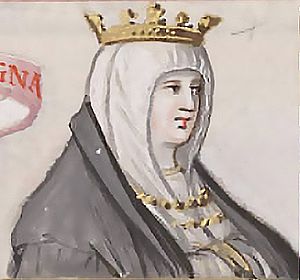Maria of Portugal, Queen of Castile facts for kids
Quick facts for kids Maria of Portugal |
|
|---|---|
 |
|
| Queen consort of Castile and León | |
| Tenure | 1328–1350 |
| Born | 9 February 1313 |
| Died | 18 January 1357 (aged 43) Évora |
| Burial | Royal Monastery of San Clemente in Seville. |
| Spouse | Alfonso XI of Castile |
| Issue | Peter of Castile |
| House | Portuguese House of Burgundy |
| Father | Afonso IV of Portugal |
| Mother | Beatrice of Castile |
| Religion | Roman Catholicism |
Maria of Portugal was a princess from Portugal, born on February 9, 1313. She became the Queen of Castile when she married King Alfonso XI of Castile in 1328. Maria was the first daughter of King Afonso IV of Portugal and his wife, Beatrice of Castile.
Contents
Becoming Queen
Maria married King Alfonso XI in 1328. As part of her marriage agreement, King Alfonso gave her control over several towns. These towns included Guadalajara, Talavera de la Reina, and Olmedo.
Life as Queen
Maria's marriage to King Alfonso was not a happy one. Even before they married, King Alfonso spent a lot of time with another noblewoman, Leonor de Guzmán. Leonor had ten children with the king, including Henry II of Castile, who would later become king.
Maria often felt left out at court because King Alfonso preferred Leonor. She likely spent much time away from the royal court, sometimes staying at the Royal Monastery of San Clemente in Seville.
In 1335, Maria returned to her father in Évora, Portugal. Her father, King Afonso IV, demanded that King Alfonso XI send Leonor away. He even formed alliances with the Pope and other rulers to put pressure on Alfonso. He also threatened to invade Castile.
In July 1340, a peace treaty was signed in Seville. King Alfonso agreed to send Leonor to a convent. This agreement helped him get support from the King of Portugal for the Battle of Río Salado. This important battle was fought on October 30, 1340. However, after the battle was over, King Alfonso did not keep his promise and returned to Leonor.
Later Years and Influence
When King Alfonso XI died on March 26, 1350, Maria gained more power. She had influence over João Afonso de Albuquerque, who was a key advisor to her son, Peter of Castile.
In 1354, Maria took part in a rebellion against her own son, King Peter. She gave the town of Toro to the rebels, which led to King Peter being imprisoned for a short time. After this event, Maria went back to Portugal.
Her Children
Maria had two children with King Alfonso XI:
- Fernando (1332–1333): He died as a baby and was buried in the monastery of San Clemente in Seville.
- Peter of Castile (1334–1369): He became King of Castile and León after his father died in 1350. King Peter married Maria de Padilla, Blanche of Bourbon, and Jeanne de Castro. His remains are now in the royal chapel of the Cathedral of Seville.
Death and Burial Place
Maria of Portugal made a will in Valladolid on November 8, 1351. In her will, she asked to be buried in the Royal Chapel of the Cathedral of Seville. This was where her husband, King Alfonso XI, had been buried. She also wished that if his remains were moved, hers should be moved too, so they could be buried together.
Maria died in Évora, Portugal, on January 18, 1357. She was first buried there. However, her wishes were not fully followed. Her remains were later moved to the Royal Monastery of San Clemente in Seville.
In 1371, King Henry II, Maria's stepson, ordered that his father, King Alfonso XI, be buried in the Royal Collegiate Church of Saint Hippolytus in Córdoba. At the same time, King Henry II decided that Maria should be buried at the monastery in Seville. Her gravestone at the monastery is simple and mentions that she is buried there with two "tender infants."
Images for kids
See also
 In Spanish: María de Portugal (1313-1357) para niños
In Spanish: María de Portugal (1313-1357) para niños
 | Selma Burke |
 | Pauline Powell Burns |
 | Frederick J. Brown |
 | Robert Blackburn |



